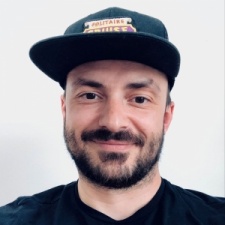Pavel Sudakov is head of research and development (R&D) at Belka Games.
As head of the department, Pavel orchestrated the birth of the company's Solitaire Cruise. He has more than a decade of experience in game production. Prior to Belka Games, Pavel worked as head of augmented reality (AR) gaming production at Snapchat and was the creative director at Bad Rabbit Games.
Sudakov is a speaker at Pocket Gamer Connects Digital #7. PocketGamer.biz spoke to him about his role at Belka games and how game developers can use R&D more effectively to help games achieve their full potential.
PocketGamer.biz: What are you speaking about at Pocket Gamer Connects Digital #7?
Pavel Sudakov: I plan on covering R&D and how it plays an important role in helping your mobile game scale. The presentation will cover what it is and how the team at Belka approaches R&D.
I will also share the team roles and functions that drive R&D, and which performance indicators to examine to grow your games. Finally, I’ll address best practices for how to continue generating fresh content ideas without burning out.
Over the last 10 years, the company has grown from a small studio of eight people to an international developer...Pavel Sudakov
Tell us a little more about Belka Games
After two years at Belka Games, I can tell that it is the best company I have ever worked for. Over the last 10 years, the company has grown from a small studio of eight people to an international developer and publisher of mobile games with over 370 employees, six offices worldwide and a presence in 65 cities.
Over the past year, we have entered the top 20 publishers in Europe, the Middle East and Africa (EMEA) region in terms of revenues alongside launching a new game in Solitaire Cruise. The new title has already broken all records and is ranked among the top two grossing solitaire games - according to the Apple App Store. Additionally, we have opened a mergers and acquisition department.
At the same time, we managed to preserve the core values and unique corporate culture of our company. It's a very friendly team, colleagues are always ready to give advice or help out in any given situation. Despite the speed and flexibility in work, the top priority for the entire company remains the quality of our projects. If you see a game made by Belka Games, rest assured - it is a very cool product.
What does your role entail?
Different companies have different frameworks in which the R&D department exists. R&D is more than just a laboratory of mad scientists with dishevelled hair who are engaged in endless research. Our R&D department is similar to other production departments with all the key elements of research, analytics and testing.
However, at Belka Games, we are focused on delivering high-quality results, quickly. The main goal of the R&D department that I lead is to make new, high-quality topical products and develop them fast. Of course, the R&D department is the future of any company, but for Belka Games - it is not just the near future - it’s tomorrow.
In my role, my primary responsibility entails the strategy of the department, team building, market research and, of course, product solutions. I invite everyone interested in learning more about research and development to join my presentation on July 13th at 15:30 (UK Time) at PGC Digital #7.
Why did you want to work in the games industry?
Growing up with parents who were engineers, they were interested in everything new. My father used to buy almost all of the new gaming platforms for me. I went through most NIntendo systems before grabbing a laptop, and finally a desktop PC.
Surprisingly, my parents encouraged me to play as much as I could. I am sure my father would have had serious questions for me if after all this I did not become a game developer.
There is a lot happening in the gaming industry - new mechanics, new storylines and more.Pavel Sudakov
What advice would you give to anyone looking to get into it?
The best time is now. There is a lot happening in the gaming industry - new mechanics, new storylines and more. If you are interested in games, if you are passionate about them, if you have ideas on how to do something new - then do it.
It may not be easy (nothing is easy at the beginning) but it will be interesting. Being able to pursue your passion and say: "I make games" is so fulfilling.
How has the games industry changed since you first started?
The industry has grown to become much more mature. In the last 10 years, many things were done on a whim, but now developers take a data-driven approach.
Taking a data-driven approach informs any hypothesis and actually shows you where you can grow and be more strategic. Also, the industry has become much more user-oriented.
Developers now are thinking much more about the players and the experience they will get than they did 10 to 15 years ago. Because of the very challenging market and products available, developers who can provide a better player experience will win.
What are your thoughts on the industry in the last 12 months?
You can't talk about the last 12 months and ignore the pandemic and its aftermath. The pandemic changed the way we work and how different industries function. There was a lot of growth in mobile gaming. An increase of free time, and in turn, encouraged developers to create more content, more features and increase development speed in order to maximize the experience for players.
What major trends do you predict in the next 12 months?
If we look at the casual mobile gaming market, I think we will see more complex games. We’re seeing the presence of different game mechanics 'under the hood'. For example, match-three game players may now go on an expedition, play with friends in hypercasual mechanics, participate in weekly events - some even incorporate farming or life simulations that encourage players to grow a bed of flowers in their garden
Over time, mobile games will become more and more difficult to define as one type of genre, and the meta will get more and more complex and interesting. A good example is Project Makeover -- at its core, the game incorporates match-three mechanics but also combines a narrative that immerses players in the game and launches weekly events that reward and engage players.
Which part of Pocket Gamer Connects Digital #7 are you most looking forward to and why?
Being a data-driven individual, I am very interested in reports on trends, market analytics, and numbers. I am excited to connect with others from the R&D departments of other companies, as well as those who work in different aspects of mobile gaming.
Book now
Pavel Sudakov is just one of more than 250 incredible speakers taking part in Pocket Gamer Connects Digital #7, which takes place online from July 12th to 16th 2021.
Find out more and book your ticket now.





















